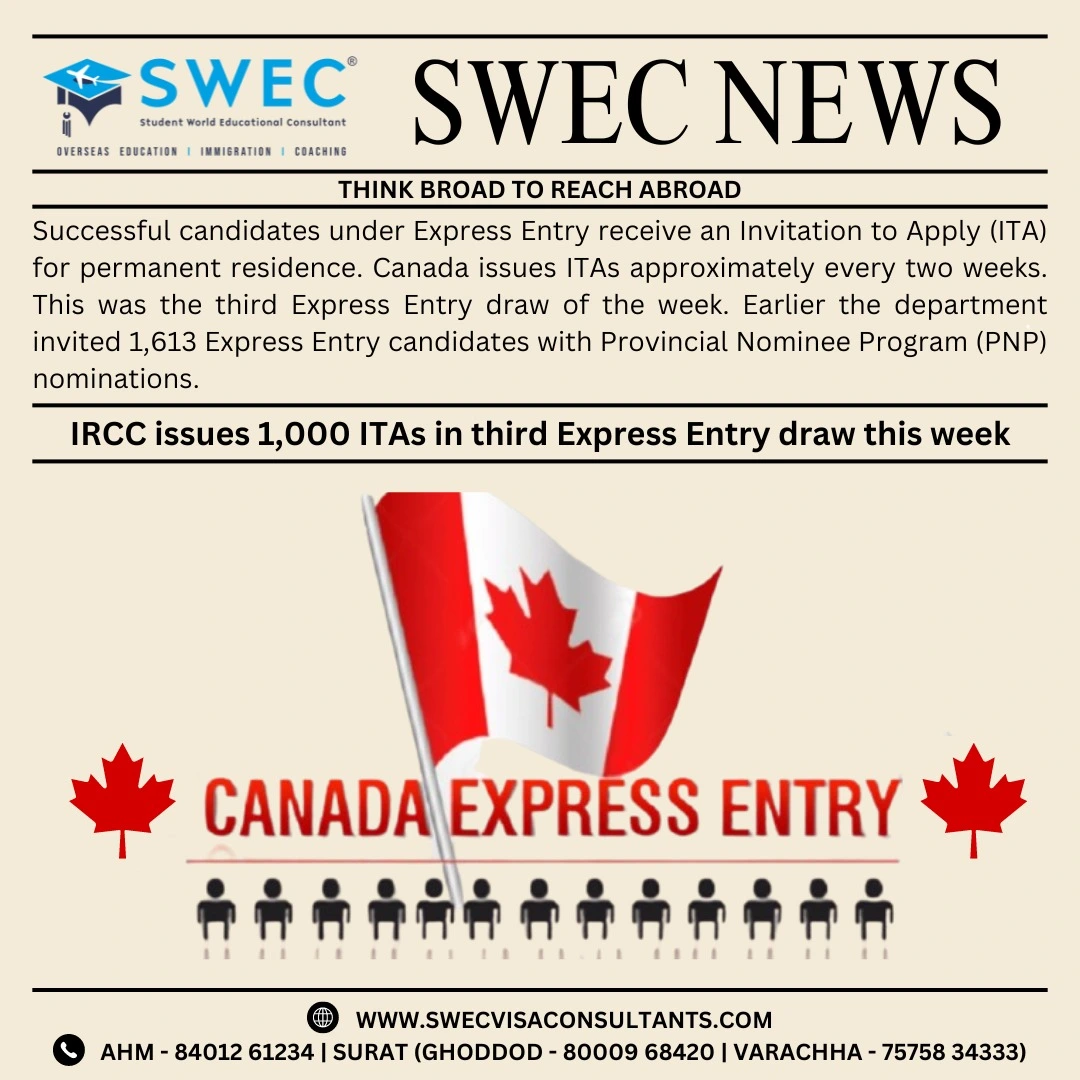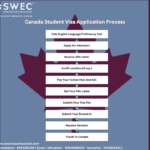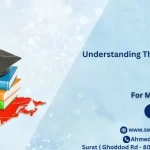Immigration, Refugees, and Citizenship Canada (IRCC) has recently conducted another Express Entry draw, issuing 1,000 Invitations to Apply (ITAs) to candidates proficient in the French language. This latest draw, held as part of IRCC’s category-based selection process, required a minimum Comprehensive Ranking System (CRS) score of 444. The emphasis on French language proficiency aligns with IRCC’s goal of supporting linguistic diversity and promoting immigration to French-speaking minority communities across Canada.
This Express Entry draw marks the third held by IRCC within a single week, reflecting the department’s active engagement in inviting candidates through various immigration pathways. Earlier in the week, 1,613 candidates who had secured a nomination under the Provincial Nominee Program (PNP) received ITAs. These candidates required a significantly higher CRS score of 743 to qualify. Additionally, on October 9, IRCC held another draw inviting 500 candidates under the Canadian Experience Class (CEC), with a minimum score requirement of 539.
A pattern of high activity in Express Entry draws has been seen recently, with a focus on candidates with specific skill sets or nominations. The most recent CEC-only draw before this busy week occurred on September 19, where IRCC issued 4,000 ITAs to CEC candidates. These individuals had a minimum CRS score of 509, which was slightly higher than the 507 required in the previous CEC draw held on August 27.
In recent months, IRCC has been refining its approach by reducing the frequency of category-based selection draws and instead focusing more on domestic applicants, particularly those already residing in Canada temporarily. For instance, the last category-based selection draw outside of French language proficiency was held on July 5, specifically targeting candidates with healthcare occupations. Since July, IRCC has issued 21,800 ITAs to Canadian Experience Class (CEC) candidates, demonstrating a commitment to converting temporary residents into permanent ones.
The increased emphasis on domestic draws fits within IRCC’s broader immigration strategy, which aims to decrease the number of temporary residents in Canada and bolster the pool of permanent residents. This approach not only helps to address critical labour shortages but also supports the government’s broader immigration goals for the year. Last October, IRCC conducted four draws, issuing a total of 9,173 invitations, indicating that the department is on track for a similarly active month this year.
Understanding Express Entry
Express Entry is a digital application management system introduced by IRCC in 2015, designed to streamline the selection of candidates for economic immigration programs. It oversees three key programs: the Federal Skilled Worker Program, the Federal Skilled Trades Program, and the Canadian Experience Class (CEC).
Candidates under Express Entry are assessed through the Comprehensive Ranking System (CRS), a points-based system that evaluates applicants based on several human capital factors, such as age, work experience, education, language proficiency, and occupation. Additional points can be awarded for applicants who have a spouse or partner, a sibling in Canada, or Canadian work experience or education.
The CRS score is pivotal in determining whether a candidate will receive an ITA in an Express Entry draw. The higher the CRS score, the better the chances of receiving an invitation, depending on the specific draw type.
Category-Based Selection in Express Entry
In May 2023, IRCC introduced category-based selection draws to better match immigration candidates with Canada’s evolving workforce needs. The goal of this initiative is to address urgent labour market shortages and ensure that skilled immigrants can contribute to key economic sectors.
IRCC has identified six categories for these draws, including:
- Healthcare
- Science, Technology, Engineering, and Mathematics (STEM)
- Trades
- Transport
- Agriculture and Agri-food
- French language proficiency
These categories were selected following extensive consultations with industry stakeholders and an in-depth analysis of labour market needs. Additionally, IRCC aims to admit 6% of all newcomers into French-speaking minority communities outside of Quebec, further emphasizing the importance of French language proficiency.
While CRS cut-off scores for category-based draws are generally lower than those for program-specific or general draws, candidates must still meet the eligibility requirements and maintain a competitive CRS score. Being in the Express Entry pool with a strong CRS score remains a significant advantage in securing an ITA, regardless of the draw type.
The increase in French language-based draws reflects Canada’s commitment to fostering linguistic diversity while addressing urgent labour shortages in key sectors. IRCC’s dynamic approach, with its focus on both domestic and category-based draws, is helping the department meet its immigration targets while supporting the country’s economic growth and demographic needs.
Detailed Overview of Recent Express Entry Draws Conducted by IRCC in 2024
Immigration, Refugees, and Citizenship Canada (IRCC) continues to actively invite candidates through its Express Entry system in 2024, targeting various categories based on urgent labour market needs, provincial nominations, and specific skill sets. Below is a detailed summary of the Express Entry draw results, focusing on the types of draws conducted, the number of Invitations to Apply (ITAs) issued, and the minimum Comprehensive Ranking System (CRS) scores required to qualify.
| Date | Draw Type | Number of ITAs | Minimum CRS Score |
| October 10, 2024 | French Language Proficiency Draw | 1,000 | 444 |
| October 9, 2024 | Canadian Experience Class (CEC) | 500 | 539 |
| October 7, 2024 | Provincial Nominee Program (PNP) | 1,613 | 743 |
| September 19, 2024 | Canadian Experience Class (CEC) | 4,000 | 509 |
| September 13, 2024 | French Language Proficiency Draw | 1,000 | 446 |
| September 9, 2024 | Provincial Nominee Program (PNP) | 911 | 732 |
| August 27, 2024 | Canadian Experience Class (CEC) | 3,300 | 507 |
| August 26, 2024 | Provincial Nominee Program (PNP) | 1,121 | 694 |
| August 15, 2024 | French Language Proficiency Draw | 2,000 | 394 |
| August 14, 2024 | Canadian Experience Class (CEC) | 3,200 | 509 |
| August 13, 2024 | Provincial Nominee Program (PNP) | 763 | 690 |
| July 31, 2024 | Canadian Experience Class (CEC) | 5,000 | 510 |
| July 30, 2024 | Provincial Nominee Program (PNP) | 964 | 686 |
| July 18, 2024 | French Language Proficiency Draw | 1,800 | 400 |
| July 17, 2024 | Canadian Experience Class (CEC) | 6,300 | 515 |
| July 16, 2024 | Provincial Nominee Program (PNP) | 1,391 | 670 |
| July 8, 2024 | French Proficiency Draw | 3,200 | 420 |
| July 5, 2024 | Healthcare Occupations Draw | 3,750 | 445 |
| July 4, 2024 | Trade Occupations Draw | 1,800 | 436 |
| July 2, 2024 | Provincial Nominee Program (PNP) | 920 | 739 |
| June 19, 2024 | Provincial Nominee Program (PNP) | 1,499 | 663 |
| May 31, 2024 | Canadian Experience Class (CEC) | 3,000 | 522 |
| May 30, 2024 | Provincial Nominee Program (PNP) | 2,985 | 676 |
| April 24, 2024 | French Proficiency Draw | 1,400 | 410 |
| April 23, 2024 | General Draw | 2,095 | 529 |
| April 11, 2024 | STEM Occupations Draw | 4,500 | 491 |
| April 10, 2024 | General Draw | 1,280 | 549 |
| March 26, 2024 | French Language Proficiency Draw | 1,500 | 388 |
| March 25, 2024 | General Draw | 1,980 | 524 |
| March 13, 2024 | Transport Occupations Draw | 975 | 430 |
| March 12, 2024 | General Draw | 2,850 | 525 |
| February 29, 2024 | French Language Proficiency Draw | 2,500 | 336 |
| February 28, 2024 | General Draw | 1,470 | 534 |
| February 16, 2024 | Agriculture and Agri-Food Draw | 150 | 437 |
| February 14, 2024 | Healthcare Occupations Draw | 3,500 | 422 |
| February 13, 2024 | General Draw | 1,490 | 535 |
| February 1, 2024 | French Language Proficiency Draw | 7,000 | 365 |
| January 31, 2024 | General Draw | 730 | 541 |
| January 23, 2024 | General Draw | 1,040 | 543 |
| January 10, 2024 | General Draw | 1,510 | 546 |
This table captures all the important information about IRCC’s 2024 Express Entry draws, including the type of draw, number of ITAs issued, and the minimum CRS score required for eligibility in each draw.
Trends and IRCC’s Approach
Throughout 2024, the frequency and nature of Express Entry draws have underscored IRCC’s multi-faceted immigration strategy. With category-based selections, a greater focus on candidates with Canadian experience, and targeted draws for specific occupations, IRCC is aligning its immigration policies with the nation’s economic priorities and demographic needs.
Notably, IRCC has placed significant emphasis on French language proficiency draws, aligning with the government’s objective of increasing immigration to French-speaking minority communities outside of Quebec. Additionally, Canadian Experience Class draws have seen a surge in the number of ITAs issued, reflecting the importance of retaining temporary residents already integrated into Canadian society.
Express Entry: A Key Immigration Pathway
Since its introduction in 2015, Express Entry has evolved into one of the most efficient and streamlined systems for managing economic immigration to Canada. The system evaluates candidates using the Comprehensive Ranking System (CRS), which considers factors like work experience, education, age, language proficiency, and other human capital factors. Candidates with higher CRS scores are more likely to receive an ITA during a draw, especially in general draws where the competition is steep.
By introducing category-based draws, IRCC has further fine-tuned the selection process to target those with skills urgently needed in Canada’s labour market. Whether through the Provincial Nominee Program, Canadian Experience Class, or targeted occupation-based draws, Express Entry continues to be a critical tool in addressing both short-term labour shortages and long-term economic growth.
With these continued efforts, Canada is positioning itself as a top destination for skilled immigrants worldwide, balancing its economic needs with demographic goals.
Conclusion
In conclusion, the 2024 Express Entry draws reflect Immigration, Refugees, and Citizenship Canada’s commitment to addressing labor shortages and meeting immigration targets. With a variety of draw types, including category-based selections, Canadian Experience Class, and Provincial Nominee Program invitations, the opportunities for candidates to secure an Invitation to Apply (ITA) remain dynamic. The focus on French language proficiency and other key skills demonstrates Canada’s need for diverse talent across various industries.
If you’re aspiring to immigrate to Canada, understanding these updates is crucial to maximizing your chances of success. SWEC Visa is here to guide you every step of the way. Our team of professional immigration experts provides personalized consultations to help you navigate the Express Entry system, ensuring that your profile stands out in future draws. With our support, you can stay ahead of changing regulations and boost your chances of securing permanent residency in Canada.
Contact SWEC Visa today to start your journey toward a successful immigration process!
FAQs
Q1. What is the Express Entry system?
Ans1. Express Entry is an online application management system used by Immigration, Refugees, and Citizenship Canada (IRCC) to select candidates for economic immigration programs, including the Federal Skilled Worker Program, Federal Skilled Trades Program, and the Canadian Experience Class.
Q2. What is an Invitation to Apply (ITA)?
Ans2. An ITA is an invitation issued to candidates in the Express Entry pool who have high Comprehensive Ranking System (CRS) scores, allowing them to apply for permanent residency in Canada.
Q3. What are category-based selection draws?
Ans3. Category-based selection draws are Express Entry draws introduced by IRCC in 2023 to address labor shortages in specific sectors like healthcare, STEM professions, trades, transport, agriculture, and French language proficiency.
Q4. What are the CRS scores, and why are they important?
Ans4. CRS scores are calculated based on factors like age, education, work experience, language skills, and adaptability. A high CRS score increases the chances of receiving an ITA in an Express Entry draw.
Q5. What was the significance of the French language proficiency draws?
Ans5. The French language proficiency draws aim to meet Canada’s target of admitting 6% of all newcomers into French-speaking minority communities outside Quebec, by inviting candidates who demonstrate proficiency in French.
Q6. How often does IRCC conduct Express Entry draws?
Ans6. IRCC conducts Express Entry draws regularly. In 2024, there have been multiple draws each month, focusing on different categories like Canadian Experience Class, Provincial Nominee Program, and French language proficiency.
Q7. What is the minimum CRS score required to receive an ITA?
Ans7. The minimum CRS score varies with each draw. For example, in the October 2024 French language proficiency draw, the minimum score was 444, while for the Provincial Nominee Program (PNP) draw in October, it was 743.
Q8. How can SWEC Visa help with the Express Entry process?
Ans8. SWEC Visa offers expert guidance throughout the Express Entry process, helping applicants build strong profiles, understand eligibility criteria, and improve their CRS scores, thereby maximizing their chances of receiving an ITA.
Q9. What is the Provincial Nominee Program (PNP)?
Ans9. The PNP allows Canadian provinces and territories to nominate individuals for permanent residency based on their ability to contribute to the local labor market. PNP candidates in the Express Entry pool receive additional CRS points, boosting their chances of receiving an ITA.
Q10. Why have Canadian Experience Class (CEC) draws increased in frequency?
Ans10. IRCC has increased the frequency of CEC draws in 2024 to prioritize candidates who have gained work experience in Canada, helping to meet the goal of transitioning temporary residents to permanent residency.





